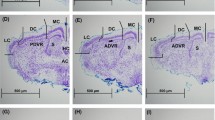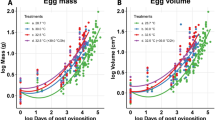Abstract
Stressful environments in utero can have a profound influence on cognitive functions and learning ability. In lizards, thermal environments experienced by embryos can shape a range of traits, including sex, body size, and locomotor performance, which may influence fitness. Recent studies suggest that incubation temperatures may also influence brain development and learning ability of some lizard species. Therefore, predicted increases in nest temperatures of lizards may not only affect hatchling morphology and performance, but could also affect their learning ability. To investigate how incubation temperatures influence cognitive abilities of hatchlings, we incubated eggs of the velvet gecko, Amalosia lesueurii, under two fluctuating temperature regimes. The warm treatment mimicked the thermal profiles of currently used partly shaded communal nests (mean = 24.3 °C, range 18.4–31.1 °C), and the hot treatment simulated thermal profiles that could be experienced in sun-exposed nests in 2050 (mean = 28.9 °C, range 19.1–38.1 °C). At age three to four weeks, we measured the ability of hatchlings to locate an open shelter in a Y-maze choice test. Both hot and warm-incubated hatchlings successfully learned the task, but hatchlings from the warm-temperature treatment learned the task faster, and made fewer mistakes in the first five trials than hot-incubated hatchlings. These patterns were consistent for hatchlings from two geographic locations, suggesting that thermally stressful conditions in utero may alter the learning abilities of hatchling lizards. Because learning ability can affect the survival of hatchling velvet geckos, future increase in nest temperatures may have wide reaching impacts on populations.



Similar content being viewed by others
References
Abayarathna T, Murray BR, Webb JK (2019) Higher incubation temperatures produce long-lasting upward shifts in cold tolerance, but not heat tolerance, of hatchling geckos. Biol Open. https://doi.org/10.1242/bio.042564
Amiel JJ, Bao SS, Shine R (2017) The effects of incubation temperature on the development of the cortical forebrain in a lizard. Anim Cogn 20:117–125. https://doi.org/10.1007/s10071-016-0993-2
Amiel JJ, Lindstroem T, Shine R (2014) Egg incubation effects generate positive correlations between size, speed and learning ability in young lizards. Anim Cogn 17:337–347. https://doi.org/10.1007/s10071-013-0665-4
Amiel JJ, Shine R (2012) Hotter nests produce smarter young lizards. Biol Let 8:372–374
Anderson GB, Oleson KW, Jones B, Peng RD (2018) Projected trends in high-mortality heatwaves under different scenarios of climate, population, and adaptation in 82 US communities. Clim Change 146:455–470. https://doi.org/10.1007/s10584-016-1779-x
Angilletta MJ (2009) Thermal adaptation: a theoretical and empirical synthesis. Oxford University Press, Oxford
Angilletta MJ, Zelic MH, Adrian GJ, Hurliman AM, Smith CD (2013) Heat tolerance during embryonic development has not diverged among populations of a widespread species (Sceloporus undulatus). Conserv Physiol. https://doi.org/10.1093/conphys/cot018
Arenas A, Farina WM (2008) Age and rearing environment interact in the retention of early olfactory memories in honeybees. J Compar Physiol A 194:629–640. https://doi.org/10.1007/s00359-008-0337-z
Burghardt GM (1977) Learning processes in reptiles. Biol the Reptil 7:555–681
Carlo MA, Riddell EA, Levy O, Sears MW (2018) Recurrent sublethal warming reduces embryonic survival, inhibits juvenile growth, and alters species distribution projections under climate change. Ecol Lett 21:104–116. https://doi.org/10.1111/ele.12877
Chevin LM, Lande R, Mace GM (2010) Adaptation, plasticity, and extinction in a changing environment: towards a predictive theory. PLoS Biol. https://doi.org/10.1371/journal.pbio.1000357
Clark BF, Amiel JJ, Shine R, Noble DWA, Whiting MJ (2014) Colour discrimination and associative learning in hatchling lizards incubated at 'hot' and 'cold' temperatures. Behav Ecol Sociobiol 68:239–247. https://doi.org/10.1007/s00265-013-1639-x
Coomber P, Crews D, Gonzalez-Lima F (1997) Independent effects of incubation temperature and gonadal sex on the volume and metabolic capacity of brain nuclei in the leopard gecko (Eublepharis macularius), a lizard with temperature-dependent sex determination. J Compar Neurol 380:409–421
Cowan T, Purich A, Perkins S, Pezza A, Boschat G, Sadler K (2014) More frequent, longer, and hotter heat waves for Australia in the twenty-first century. J Clim 27:5851–5871
Crews D, Coomber P, Gonzalez-Lima F (1997) Effects of age and sociosexual experience on the morphology and metabolic capacity of brain nuclei in the leopard gecko (Eublepharis macularius), a lizard with temperature-dependent sex determination. Brain Res 758:169–179
Day LB, Crews D, Wilczynski W (1999) Spatial and reversal learning in congeneric lizards with different foraging strategies. Anim Behav 57:393–407
Dayananda B, Gray S, Pike D, Webb JK (2016) Communal nesting under climate change: fitness consequences of higher incubation temperatures for a nocturnal lizard. Glob Change Biol 22:2405–2414
Dayananda B, Penfold S, Webb J (2017) The effects of incubation temperature on locomotor performance, growth and survival in hatchling velvet geckos. J Zool 303:46–53. https://doi.org/10.1111/jzo.12460
Dayananda B, Webb JK (2017) Incubation under climate warming affects learning ability and survival in hatchling lizards. Biol Let. https://doi.org/10.1098/rsbl.2017.0002
Deeming D, Ferguson M (1991) Egg incubation: Its effects on embryonic development in birds and reptiles. Cambridge University Press, New York
Deeming DC (2004) Post-hatching phenotypic effects of incubation in reptiles. In: Deeming DC (ed) Reptilian incubation: environment, evolution and behaviour. Nottingham University Press, Nottingham, pp 229–251
Doody JS, Guarino E, Georges A, Corey B, Murray G, Ewert M (2006) Nest site choice compensates for climate effects on sex ratios in a lizard with environmental sex determination. Evol Ecol 20:307–330
Dowdy A et al (2015) East coast cluster report. Climate change in Australia projections for Australia's natural resource management regions: cluster reports
Dukas R (2004) Evolutionary biology of animal cognition. Annu Rev Ecol Evol Syst 35:347–374. https://doi.org/10.1146/annurev.ecolsys.35.112202.130152
Groh C, Tautz J, Rossler W (2004) Synaptic organization in the adult honey bee brain is influenced by brood-temperature control during pupal development. Proc Natl Acad Sci USA 101:4268–4273. https://doi.org/10.1073/pnas.0400773101
Hall JM, Warner DA (2018) Thermal spikes from the urban heat island increase mortality and alter physiology of lizard embryos. J Exp Biol. https://doi.org/10.1242/jeb.181552
Howell DC (2002) Statistical methods for psychology, 5th edn. Pacific Grove, Duxbury
Kang S, Eltahir EAB (2018) North China Plain threatened by deadly heatwaves due to climate change and irrigation. Nat Commun. https://doi.org/10.1038/s41467-018-05252-y
LaDage LD, Roth TC, Cerjanic AM, Sinervo B, Pravosudov VV (2012) Spatial memory: are lizards really deficient? Biol Lett 8:939–941. https://doi.org/10.1098/rsbl.2012.0527
Levy O, Buckley LB, Keitt TH, Smith CD, Boateng KO, Kumar DS, Angilletta MJ (2015) Resolving the life cycle alters expected impacts of climate change. Proc R Soc B 282:1–9. https://doi.org/10.1098/rspb.2015.0837
Macphail EM (1982) Brain and intelligence in vertebrates. Oxford University Press, New York
Markham JA, Koenig JI (2011) Prenatal stress: role in psychotic and depressive diseases. Psychopharmacology 214:89–106. https://doi.org/10.1007/s00213-010-2035-0
McEwen BS, Eiland L, Hunter RG, Miller MM (2012) Stress and anxiety: structural plasticity and epigenetic regulation as a consequence of stress. Neuropharmacology 62:3–12. https://doi.org/10.1016/j.neuropharm.2011.07.014
Morand-Ferron J, Cole EF, Quinn JL (2016) Studying the evolutionary ecology of cognition in the wild: a review of practical and conceptual challenges. Biol Rev 91:367–389. https://doi.org/10.1111/brv.12174
Noble DWA, Stenhouse V, Schwanz LE (2018) Developmental temperatures and phenotypic plasticity in reptiles: a systematic review and meta-analysis. Biol Rev 93:72–97. https://doi.org/10.1111/brv.12333
Pallotta MM, Turano M, Ronca R, Mezzasalma M, Petraccioli A, Odierna G, Capriglione T (2017) Brain gene expression is influenced by incubation temperature during leopard gecko (Eublepharis macularius) development. J Exp Zool Part B 328:360–370. https://doi.org/10.1002/jez.b.22736
Purves D, Lichtman JW (1985) Principles of neural development. Sinauer Associates Sunderland, Sunderland
Rowe C, Healy SD (2014) Measuring variation in cognition. Behav Ecol 25:1287–1292. https://doi.org/10.1093/beheco/aru090
Sakata JT, Coomber P, Gonzalez-Lima F, Crews D (2000) Functional connectivity among limbic brain areas: differential effects of incubation temperature and gonadal sex in the leopard gecko, Eublepharis macularius. Brain Behav Evol 55:139–151
Sakata JT, Crews D (2004) Cytochrome oxidase activity in the preoptic area correlates with differences in sexual behavior of intact and castrated male leopard geckos (Eublepharis macularius). Behav Neurosci 118:857–862. https://doi.org/10.1037/0735-7044.118.4.857
Sakata JT, Crews D, Gonzalez-Lima F (2005) Behavioral correlates of differences in neural metabolic capacity. Brain Res Rev 48:1–15. https://doi.org/10.1016/j.brainresrev.2004.07.017
Schoech SJ, Rensel MA, Heiss RS (2011) Short- and long-term effects of developmental corticosterone exposure on avian physiology, behavioral phenotype, cognition, and fitness: a review. Curr Zool 57:514–530. https://doi.org/10.1093/czoolo/57.4.514
Shettleworth SJ (2001) Animal cognition and animal behaviour. Anim Behav 61:277–286
Shine R, Elphick MJ (2001) The effect of short-term weather fluctuations on temperatures inside lizard nests, and on the phenotypic traits of hatchling lizards. Biol J Lin Soc 72:555–565. https://doi.org/10.1006/bijl.2000.0516
Siviter H, Deeming DC, van Giezen M, Wilkinson A (2017) Incubation environment impacts the social cognition of adult lizards. R Soc Open Sci 4:170742
Sol D, Bacher S, Reader SM, Lefebvre L (2008) Brain size predicts the success of mammal species introduced into novel environments. Am Nat 172:S63–S71. https://doi.org/10.1086/588304
Sol D, Duncan RP, Blackburn TM, Cassey P, Lefebvre L (2005) Big brains, enhanced cognition, and response of birds to novel environments. Proc Natl Acad Sci USA 102:5460–5465. https://doi.org/10.1073/pnas.0408145102
Tautz J, Maier S, Groh C, Rossler W, Brockmann A (2003) Behavioral performance in adult honey bees is influenced by the temperature experienced during their pupal development. Proc Natl Acad Sci USA 100:7343–7347. https://doi.org/10.1073/pnas.1232346100
Telemeco RS et al (2017) Lizards fail to plastically adjust nesting behavior or thermal tolerance as needed to buffer populations from climate warming. Glob Change Biol 23:1075–1084
West-Eberhardt MJ (2003) Developmental plasticity and evolution. Oxford University Press, Oxford
While GM, Noble DWA, Uller T, Warner DA, Riley JL, Du WG, Schwanz LE (2018) Patterns of developmental plasticity in response to incubation temperature in reptiles. J Exp Zool 2018:1–15
Wilkinson A, Huber L (2012) Cold-blooded cognition: reptilian cognitive abilities. The oxford handbook of comparative evolutionary psychology. Oxford University Press, pp 129–143
Wright TF, Eberhard JR, Hobson EA, Avery ML, Russello MA (2010) Behavioral flexibility and species invasions: the adaptive flexibility hypothesis. Ethol Ecol Evol 22:393–404. https://doi.org/10.1080/03949370.2010.505580
Acknowledgements
We thank Gemma Armstrong and Susan Fenech for their assistance with technical issues in the laboratory. We thank Reannan Honey for preparing the Y maze. We appreciate the help provided by Reannan Honey, Yingyod Lapwong, and Santiago Cuartas in the field. We thank Rowena Morris for providing us with access to the study sites in Dharawal National Park, and Phil Craven and Bruce Gray for facilitating access to study sites near Nowra. We thank Graham Alexander and Daniel Warner for reviewing an earlier version of the manuscript, and four anonymous reviewers who provided critical comments and suggestions that helped to improve the final version.
Funding
The project was supported by a UTS postgraduate research support grant to TA, and a UTS research grant to JKW.
Author information
Authors and Affiliations
Corresponding author
Ethics declarations
Conflict of interest
Theja Abayarathna and Jonathan Webb declare that they have no conflict of interest.
Ethical approval
All applicable international, national, and institutional guidelines for the care and use of animals were followed. The procedures described herein were approved by the UTS Animal Care and Ethics Committee (protocol #2012000256 to JKW). The collection of geckos from the study sites was approved by the NSW National Parks and Wildlife Service (scientific licence SL101013 to JKW).
Additional information
Publisher's Note
Springer Nature remains neutral with regard to jurisdictional claims in published maps and institutional affiliations.
Electronic supplementary material
Below is the link to the electronic supplementary material.
Rights and permissions
About this article
Cite this article
Abayarathna, T., Webb, J.K. Effects of incubation temperatures on learning abilities of hatchling velvet geckos. Anim Cogn 23, 613–620 (2020). https://doi.org/10.1007/s10071-020-01365-4
Received:
Revised:
Accepted:
Published:
Issue Date:
DOI: https://doi.org/10.1007/s10071-020-01365-4




